I bought Ascendancy (and the three currently-available expansions)
at UK Games Expo, and I've just got it to the table.
This is by the same designers as Firefly, and it's similarly a
long and sprawling game. More experienced players can apparently
expect 60 to 90 minutes per head, plus another 60 if the (NPC) Borg
are involved; we played with just the base game contents (Federation,
Klingons and Romulans), and took rather longer. We'd all read the
rulebook beforehand, but it makes rather more sense with the
components in front of one.
You begin with a fair bit of stuff: three separate resources
(Production, Research, Culture), a starting technological advancement,
some race-specific rules, and lots of things to build.
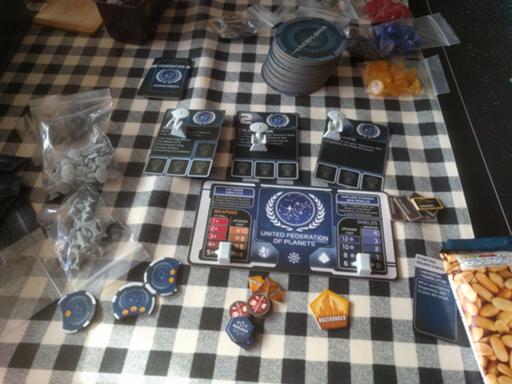
Play is in a defined area (I used the three-foot mat I bought for
X-Wing), because the map is flexible. I've played a lot of 4X games
over the years, and this is the first one I've met that does something
really interesting with the "Explore" side of things. Until a system
has two warp connections, it can be pivoted round the system it's
connected to. And that's how you can get into contact with other
powers…
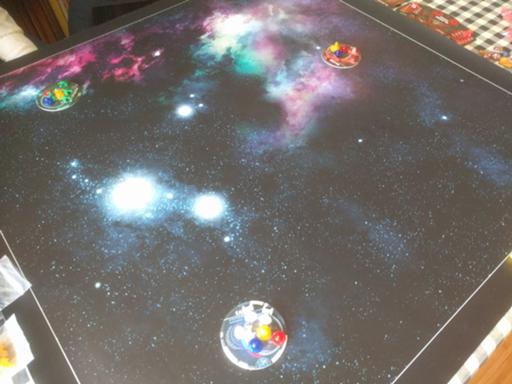
We quickly started to expand (and missed the rules about fleet
limits). There is some risk of very different early worlds and
contacts knocking a player back and relegating them to a kingmaking
role, but I think that stacking the decks may fix this.
When you reveal a new world, you take a disc that describes the type
of resource the world holds, and an exploration card that may tell you
what sort of civilisation is there (or may provoke some other event).
The combination of the two tells you whether it's worth invading,
colonising, or simply inviting them to join your civilisation (the
Federation is particularly good at the last). Planets can have
resource nodes; resource nodes produce resources; you spend resources
on building stuff, on research (you have a deck of advancements
specific to your race), and on getting Ascendancy tokens which are
mostly what win you the game (though conquering and holding enemy
homeworlds can also do it).

First contact between Klingons and Romulans. It went fairly well, ish.
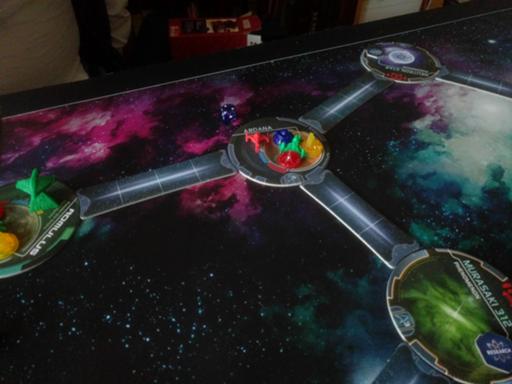
And between Federation and Romulans. (An awkward rule is that you
can't move into a sector with another player's ships unless you have
their permission, though you can attack from an adjacent sector. We
kept wanting to move into the sector before doing the space battle
or negotiation or whatever was going to happen.)
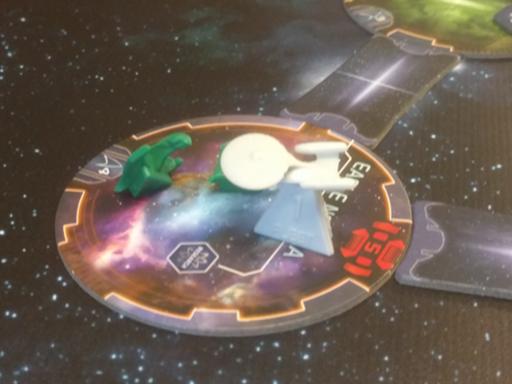
The map nearly complete. Things got fairly intense at this point and I
didn't take any more photos for a bit.
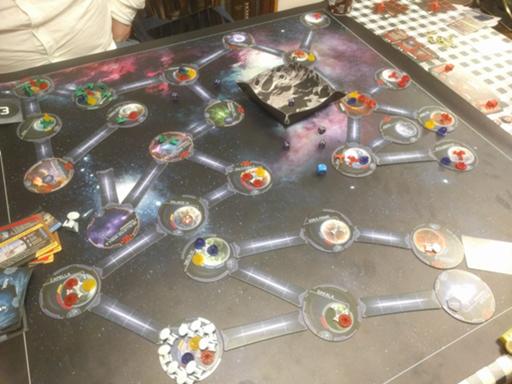
At one point the Romulans took over the Klingon homeworld, and in
order to get it back the Klingons bombed it to extinction. Which
seemed quite appropriate, really.
End game. We each reached the winning condition (five Ascendancy
tokens and control of one's homeworld) on the same turn, and tie-broke
on systems controlled – where I was a distant third. But I still had a
very good time playing the game, and I'd definitely like to give it
another go.
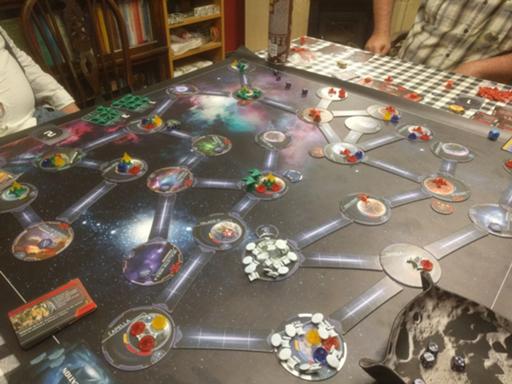
The rules are fiddly and not always well written. (The unofficial
composite rulebook on boardgamegeek runs to 72 pages, though quite a
bit of that deals with the Borg expansion that we weren't using in
this game.) We got the hang of it by the end, though.
I'm not a great fan of Star Trek, but I do like this kind of space
4X game where you colonise worlds, gather resources, and build ships –
and while I'd prefer a more generic setting, I can always play it as
though it didn't have all the branding, since while the card titles
can give some flavour you don't need to recognise names to work out
how to play them. This game fills the hole that Twilight Imperium
used to take before I sold it on.
Comments on this post are now closed. If you have particular grounds for adding a late comment, comment on a more recent post quoting the URL of this one.